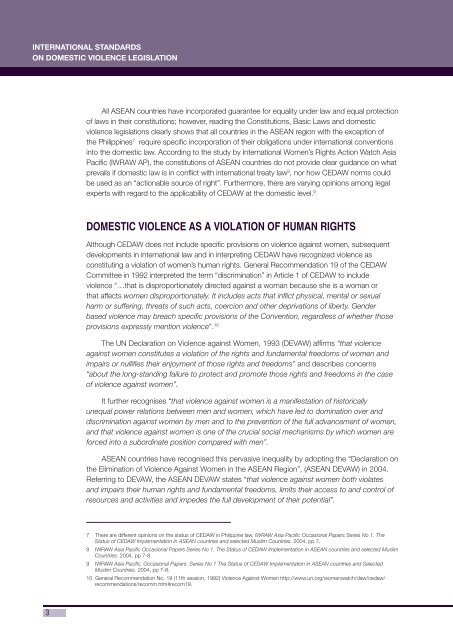Domestic Violence Legislation and its Implementation
Domestic Violence Legislation and its Implementation
Domestic Violence Legislation and its Implementation
You also want an ePaper? Increase the reach of your titles
YUMPU automatically turns print PDFs into web optimized ePapers that Google loves.
INTERNATIONAL STANDARDS<br />
ON DOMESTIC VIOLENCE LEGISLATION<br />
3<br />
All ASEAN countries have incorporated guarantee for equality under law <strong>and</strong> equal protection<br />
of laws in their constitutions; however, reading the Constitutions, Basic Laws <strong>and</strong> domestic<br />
violence legislations clearly shows that all countries in the ASEAN region with the exception of<br />
the Philippines 7 require specifi c incorporation of their obligations under international conventions<br />
into the domestic law. According to the study by International Women’s Rights Action Watch Asia<br />
Pacifi c (IWRAW AP), the constitutions of ASEAN countries do not provide clear guidance on what<br />
prevails if domestic law is in confl ict with international treaty law 8 , nor how CEDAW norms could<br />
be used as an “actionable source of right”. Furthermore, there are varying opinions among legal<br />
experts with regard to the applicability of CEDAW at the domestic level. 9<br />
DOMESTIC VIOLENCE AS A VIOLATION OF HUMAN RIGHTS<br />
Although CEDAW does not include specifi c provisions on violence against women, subsequent<br />
developments in international law <strong>and</strong> in interpreting CEDAW have recognized violence as<br />
constituting a violation of women’s human rights. General Recommendation 19 of the CEDAW<br />
Committee in 1992 interpreted the term “discrimination” in Article 1 of CEDAW to include<br />
violence “…that is disproportionately directed against a woman because she is a woman or<br />
that affects women disproportionately. It includes acts that infl ict physical, mental or sexual<br />
harm or suffering, threats of such acts, coercion <strong>and</strong> other deprivations of liberty. Gender<br />
based violence may breach specifi c provisions of the Convention, regardless of whether those<br />
provisions expressly mention violence”. 10<br />
The UN Declaration on <strong>Violence</strong> against Women, 1993 (DEVAW) affi rms “that violence<br />
against women constitutes a violation of the rights <strong>and</strong> fundamental freedoms of women <strong>and</strong><br />
impairs or nullifi es their enjoyment of those rights <strong>and</strong> freedoms” <strong>and</strong> describes concerns<br />
“about the long-st<strong>and</strong>ing failure to protect <strong>and</strong> promote those rights <strong>and</strong> freedoms in the case<br />
of violence against women”.<br />
It further recognises “that violence against women is a manifestation of historically<br />
unequal power relations between men <strong>and</strong> women, which have led to domination over <strong>and</strong><br />
discrimination against women by men <strong>and</strong> to the prevention of the full advancement of women,<br />
<strong>and</strong> that violence against women is one of the crucial social mechanisms by which women are<br />
forced into a subordinate position compared with men”.<br />
ASEAN countries have recognised this pervasive inequality by adopting the “Declaration on<br />
the Elimination of <strong>Violence</strong> Against Women in the ASEAN Region”, (ASEAN DEVAW) in 2004.<br />
Referring to DEVAW, the ASEAN DEVAW states “that violence against women both violates<br />
<strong>and</strong> impairs their human rights <strong>and</strong> fundamental freedoms, lim<strong>its</strong> their access to <strong>and</strong> control of<br />
resources <strong>and</strong> activities <strong>and</strong> impedes the full development of their potential”.<br />
7 There are different opinions on the status of CEDAW in Philippine law. IWRAW Asia Pacifi c Occasional Papers Series No 1. The<br />
Status of CEDAW <strong>Implementation</strong> in ASEAN countries <strong>and</strong> selected Muslim Countries. 2004, pp 7.<br />
8 IWRAW Asia Pacifi c Occasional Papers Series No 1. The Status of CEDAW <strong>Implementation</strong> in ASEAN countries <strong>and</strong> selected Muslim<br />
Countries. 2004, pp 7-8.<br />
9 IWRAW Asia Pacifi c. Occasional Papers. Series No 1 The Status of CEDAW <strong>Implementation</strong> in ASEAN countries <strong>and</strong> Selected<br />
Muslim Countries. 2004, pp 7-8.<br />
10 General Recommendation No. 19 (11th session, 1992) <strong>Violence</strong> Against Women http://www.un.org/womenwatch/daw/cedaw/<br />
recommendations/recomm.htm#recom19.

















